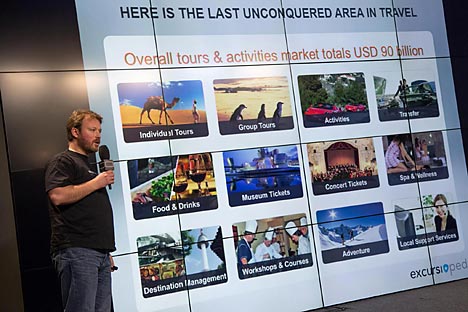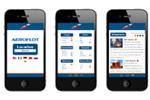Russian travel startup puts activity above location

Excursiopedia is an online retail platform where the excursion guides and the tourists find each other. Source: Press Photo
Excursiopedia, the online platform for booking excursions with local guides and small, local companies, is the brainchild of experienced businessman Kirill Sermyagin. The core audience for this service includes active travelers who would rather put together an interesting trip instead of just a change of scenery.
These travelers, as a rule, have already booked their flights and hotel; they want to take care of the content of the trip themselves and book visits to out of town chateaux, the Vatican or the Moulin Rouge cabaret. They may also want to book air balloon flights and rent a Ferrari online.
The field in which the startup is working is known as “Tours&Activities.” Kirill cites the figures: “According to independent market research, this sector is worth around $90 billion per year, and the U.S. is forging ahead. There, the turnover is reaching around one-third of global turnover and is around $26.8 billion per year.”
Kirill is an experienced businessman and traveler. Before he founded Excursiopedia, he worked for a long time in the financial sector and personally traveled half way around the world by car (among his many trips, for example, is a road trip from Moscow to Gibraltar).
The businessman also wanted to spend his free time while traveling doing something interesting and constructive. Searching the Internet or exploring the local area provided a partial solution, but it robbed him of time and energy.
In addition, friends and acquaintances began to ask Kirill to share the results of his research with them — the routes, locations and names of guides for their own vacations.
The businessman’s idea just came to him, and soon the small tourist agency was open for business. Sermyagin faced the issue of absorbing activities from a new angle: Clients would book flights and hotels, but they did not stop there; they began to request that the agency arrange interesting and unusual experiences.
Local guides and entertainment were already needed on a large scale. “As a rule, European agencies use sites such as Expedia or Booking.com to search for tickets and hotels. Entertainment is difficult to search for and book online. This, however, is not the main problem. The question of trust is important. If when organizing your own trip you can forget about the excursions you didn’t enjoy, you cannot allow this to happen when organizing a trip for a client,” says Kirill.
The need for a broad guide and local company database to arrange excursions was evident. Kirill began to undertake his own investigation, to find out how guides advertised their services.
“Let’s take, for example, a Russian-speaking guide in Munich. Their potential clients are scattered all over the world. In practice, however, the guide, even if they work through an agency, cannot advertise their services to the whole audience. Even if they prepare their own site — which is not difficult given today’s technology — they will still have a great deal of work to do. They will need money to take the site forward: advertising, search optimization. Apart from that, it also requires time as well as general knowledge. Usually therefore people just do this on their own,” Sermyagin says, sharing the results of his research. “A tour guide, for example, will lead an excursion, but they do not have time or energy to promote their services online.”
The businessman noticed the potential niche and decided to bring the demand and the proposal together. His friends Konstantin Klimov and Nikolai Slabukh, themselves experienced businessmen, also came on board with the project.
A team formed around the co-founders. They had their own savings and resources for business operations, so they simply re-orientated their activities for a different task and set to work.
In essence, Excursiopedia is an online retail platform where the providers (excursion guides) and the clients (tourists) find each other. To book an excursion, you have to go onto the site, choose the city and the excursion, set the date, and pay for the service online either with a bankcard or via PayPal.
One special feature of the site is its social nature. You can read the comments before booking any excursion and also leave your own comments and evaluation afterward. In addition, guides’ contact details are open for anyone to see, and you can ask guides any questions you have directly. This system means that guides can improve their excursions while keeping prices down.
Just a few months passed between the initial idea for Excursiopedia in 2010 and its launch. The first version of the system was launched in January 2011, and the project began to work shortly after that. It then began to attract investment from venture funds and business-angels; at present, this stands at around $1 million).
Today, there are more than 18,000 offers from private companies and tour guides on the site. Geographically, the project encompasses 1,450 cities and 140 countries. The project uses a very simple business model: The provider pays commission of around 15 percent of the cost.
The co-founders registered the company itself in Germany, where the cost of micro-payments on which the business model itself is based is low.
Excursiopedia also has competitors in the online tourist sales market. In terms of the number of offers, Excursiopedia is a leader in the individual tourism and social booking site niche.
“If you look at the market as a whole, we are in second place after GetYourGuide, but they do more group offers from large companies, so we are not in direct competition with them. In the meantime, we are planning to overtake them in terms of the numbers of offers by the end of the year. I think this is a question of market maturity. If we talk about hotels and aircraft chartering, then any company could come onto the market tomorrow, connect to the well-known sites and immediately offer hundreds of thousands of hotels around the world. There was no global distribution system or offers database on the Tours&Activities market before sites like Excursiopedia, GetYourGuide, and Viator came on stream,” says Kirill.
Sermyagin is planning to search for investment to expand the business and launch his own mobile app in the near future.
All rights reserved by Rossiyskaya Gazeta.
Subscribe
to our newsletter!
Get the week's best stories straight to your inbox


